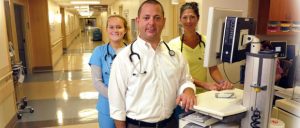As my colleague, Dr. Sean Sheehan, discussed in this recent article, gastroenterologists use endoscopy to inspect the swallowing tract, diagnose, and even treat certain swallowing disorders.
Thanks to advancements in endoscopy, endoscopic technology, and advanced training, new minimally invasive endoscopic procedures are available to patients, where once only surgery was an option.
One place where these leading-edge treatments are making a large impact is in the lives of patients diagnosed with achalasia – a rare but very serious swallowing disorder.
Achalasia
Achalasia is a movement disorder of the esophagus caused by nerve damage. As a result, the esophagus loses its ability to move food down to the stomach because the lower esophageal sphincter (LES), a muscular valve between the esophagus and stomach, cannot fully relax.
The initial symptoms of achalasia include the sensation of food or liquid “getting stuck on the way down.” These symptoms typically progress to the point where patients experience regular chest pain, regurgitation, weight loss, and nutrition problems.
There is no cure for achalasia and, if left untreated, it can lead very serious health complications.
Treatments for achalasia focus on relaxing or forcing open the LES so food and liquid can move more easily through the digestive tract. Until recently, the most effective treatment for achalasia symptoms was surgery.
POEM – A New Alternative to Surgery
Today, a new procedure called POEM (peroral endoscopic myotomy) offers patients the ability to swallow again without the risks and recovery from a major surgery.
POEM is an incisionless, endoscopic procedure where the doctor uses natural pathways in the body to reach the “trouble spot,” in this case the LES. An endoscope equipped with specialized tools is inserted into the mouth and through the esophagus, tunneling through the submucosa, or lining, of the esophagus. In the lower esophagus, the endoscopist uses specialized tools to cut the LES, releasing excessive pressure.
The POEM procedure requires an overnight stay in the hospital. Most patients do not require pain medication or intravenous fluids by the next day, and can be discharged to home.
POEM is best performed in a high-volume center by a specialist with experience and advanced training in performing therapeutic endoscopy. The gastroenterologists at Albany Gastroenterology Consultants and St. Peter’s Hospital Advanced Endoscopy & Hepatobiliary Center are highly experienced in a wide range of endoscopic procedures.
Albany Gastroenterology Consultants is located at 1375 Washington Ave. Suite 101, in Albany, directly across from the University at Albany SUNY campus.
St. Peter’s Hospital Advanced Endoscopy & Hepatobiliary Center is located at St. Peter’s Hospital, 315 South Manning Blvd. in Albany.
For more information, please call 518-438-4483.


